四年级上学期英语知识点总结
- 格式:doc
- 大小:51.54 KB
- 文档页数:6
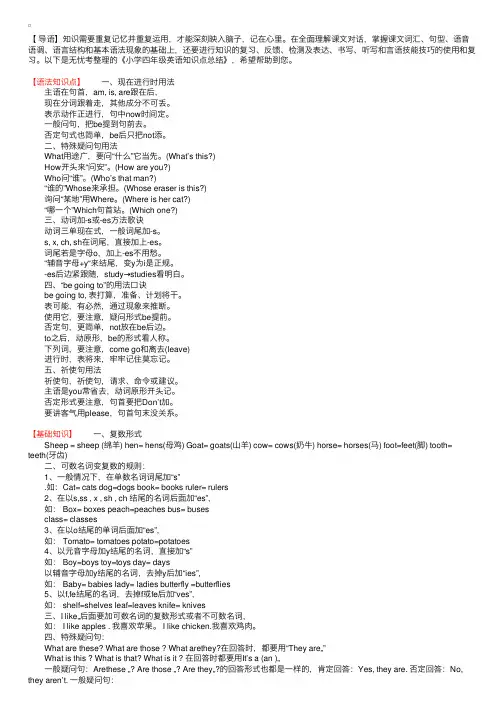
【导语】知识需要重复记忆并重复运⽤,才能深刻映⼊脑⼦,记在⼼⾥。
在全⾯理解课⽂对话,掌握课⽂词汇、句型、语⾳语调、语⾔结构和基本语法现象的基础上,还要进⾏知识的复习、反馈、检测及表达、书写、听写和⾔语技能技巧的使⽤和复习。
以下是⽆忧考整理的《⼩学四年级英语知识点总结》,希望帮助到您。
【语法知识点】 ⼀、现在进⾏时⽤法 主语在句⾸,am, is, are跟在后, 现在分词跟着⾛,其他成分不可丢。
表⽰动作正进⾏,句中now时间定。
⼀般问句,把be提到句前去。
否定句式也简单,be后只把not添。
⼆、特殊疑问句⽤法 What⽤途⼴,要问“什么”它当先。
(What’s this?) How开头来“问安”。
(How are you?) Who问“谁”。
(Who’s that man?) “谁的”Whose来承担。
(Whose eraser is this?) 询问“某地”⽤Where。
(Where is her cat?) “哪⼀个”Which句⾸站。
(Which one?) 三、动词加-s或-es⽅法歌诀 动词三单现在式,⼀般词尾加-s。
s, x, ch, sh在词尾,直接加上-es。
词尾若是字母o,加上-es不⽤愁。
“辅⾳字母+y“来结尾,变y为i是正规。
-es后边紧跟随,study→studies看明⽩。
四、“be going to”的⽤法⼝诀 be going to, 表打算,准备、计划将⼲。
表可能,有必然,通过现象来推断。
使⽤它,要注意,疑问形式be提前。
否定句,更简单,not放在be后边。
to之后,动原形,be的形式看⼈称。
下列词,要注意,come go和离去(leave) 进⾏时,表将来,牢牢记住莫忘记。
五、祈使句⽤法 祈使句,祈使句,请求、命令或建议。
主语是you常省去,动词原形开头记。
否定形式要注意,句⾸要把Don’t加。
要讲客⽓⽤please,句⾸句末没关系。
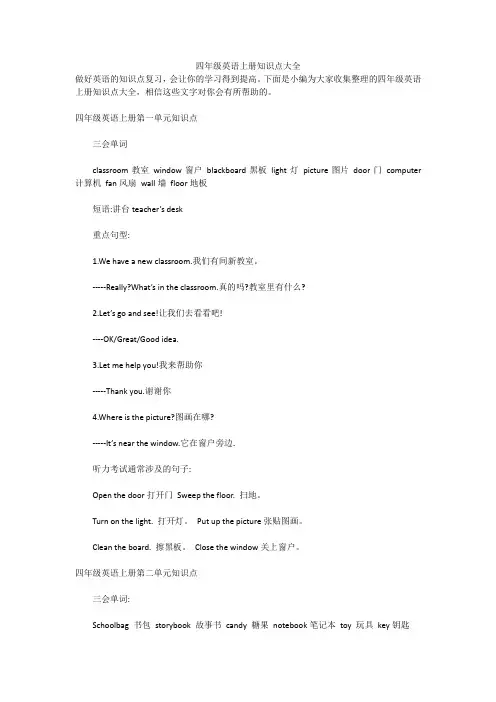
四年级英语上册知识点大全做好英语的知识点复习,会让你的学习得到提高。
下面是小编为大家收集整理的四年级英语上册知识点大全,相信这些文字对你会有所帮助的。
四年级英语上册第一单元知识点三会单词classroom教室window窗户blackboard黑板light灯picture图片door门computer 计算机fan风扇wall墙floor地板短语:讲台teacher’s desk重点句型:1.We have a new classroom.我们有间新教室。
-----Really?What’s in the classroom.真的吗?教室里有什么?2.Let’s go and see!让我们去看看吧!----OK/Great/Good idea.3.Let me help you!我来帮助你-----Thank you.谢谢你4.Where is the picture?图画在哪?-----It’s near the window.它在窗户旁边.听力考试通常涉及的句子:Open the door打开门Sweep the floor. 扫地。
Turn on the light. 打开灯。
Put up the picture张贴图画。
Clean the board. 擦黑板。
Close the window关上窗户。
四年级英语上册第二单元知识点三会单词:Schoolbag 书包storybook 故事书candy 糖果notebook笔记本toy 玩具key钥匙语文书Chinese book 英语书English book 数学书maths book重点句型:1.I have a new schoolbag. 我有一个新书包。
----Really?2.What’s in your schoolbag?你书包里有什么?----An English book, a maths book and three storybooks.一本英语书,一本数学书和三本故事书.3.what colour is it?它是什么颜色?-----It’s blue an d white.它是蓝白色的.4.What’s in it?它里面有什么?-----An English book.一本英语书.5.Here it is!它在这里-----Thank you so much!非常感谢听力考试通常涉及的句子:Put your Chinese book in your desk.把你的语文书话在你的书桌里Put your pencil box on your English book把你的铅笔盒放在你的英语书上Put your maths book under your schoolbag把你的数学书放在你的书包下面Put your eraser near your pencil box 把你的橡皮放在你的铅笔盒旁边四年级英语上册第三单元知识点三会单词:Strong强壮的quiet安静的文静的hair头发shoe鞋glasses眼镜friendly友好的重点句型:1. What's his name? /Who’s he?他叫什么名字?-----His name is Zhang Peng.他叫张鹏。
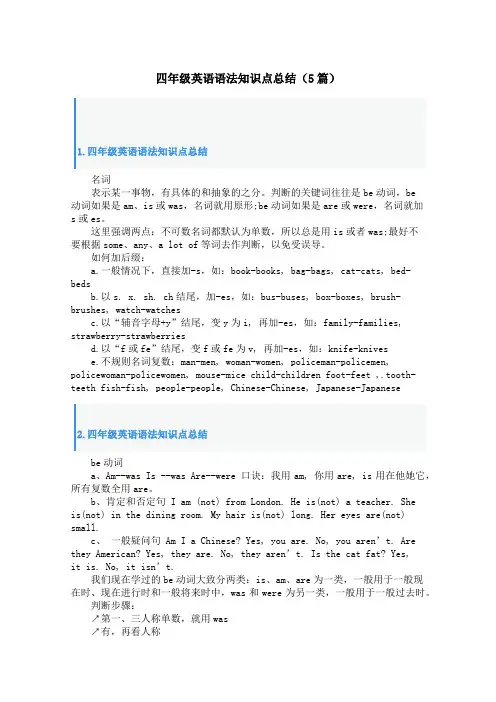
四年级英语语法知识点总结(5篇)1.四年级英语语法知识点总结名词表示某一事物,有具体的和抽象的之分。
判断的关键词往往是be动词,be动词如果是am、is或was,名词就用原形;be动词如果是are或were,名词就加s或es。
这里强调两点:不可数名词都默认为单数,所以总是用is或者was;最好不要根据some、any、a lot of等词去作判断,以免受误导。
如何加后缀:a.一般情况下,直接加-s,如:book-books, bag-bags, cat-cats, bed-bedsb.以s. x. sh. ch结尾,加-es,如:bus-buses, box-boxes, brush-brushes, watch-watchesc.以“辅音字母+y”结尾,变y为i, 再加-es,如:family-families, strawberry-strawberriesd.以“f或fe”结尾,变f或fe为v, 再加-es,如:knife-knivese.不规则名词复数:man-men, woman-women, policeman-policemen, policewoman-policewomen, mouse-mice child-children foot-feet ,.tooth-teeth fish-fish, people-people, Chinese-Chinese, Japanese-Japanese2.四年级英语语法知识点总结be动词a、Am--was Is --was Are--were 口诀:我用am, 你用are, is用在他她它,所有复数全用are。
b、肯定和否定句 I am (not) from London. He is(not) a teacher. Sheis(not) in the dining room. My hair is(not) long. Her eyes are(not) small.c、一般疑问句Am I a Chinese? Yes, you are. No, you aren’t. Are they American? Yes, they are. No, they aren’t. Is the cat fat? Yes,it is. No, it isn’t.我们现在学过的be动词大致分两类:is、am、are为一类,一般用于一般现在时、现在进行时和一般将来时中,was和were为另一类,一般用于一般过去时。
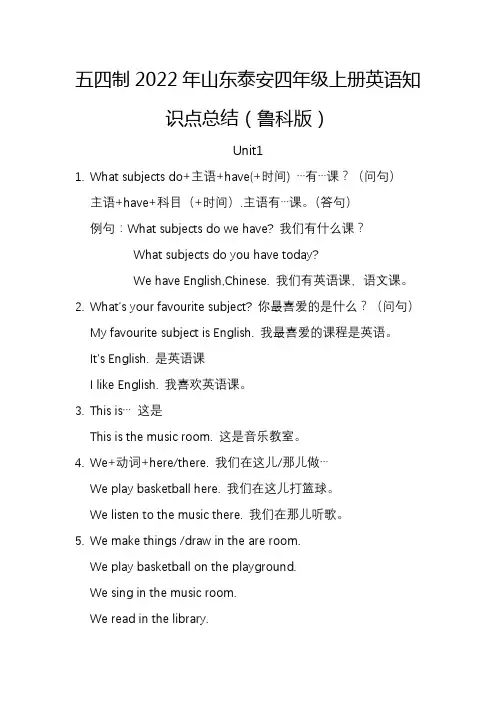
五四制2022年山东泰安四年级上册英语知识点总结(鲁科版)Unit11.What subjects do+主语+have(+时间) …有…课?(问句)主语+have+科目(+时间).主语有…课。
(答句)例句:What subjects do we have? 我们有什么课?What subjects do you have today?We have English,Chinese. 我们有英语课,语文课。
2.W hat’s your favourite subject? 你最喜爱的是什么?(问句)My favourite subject is English. 我最喜爱的课程是英语。
I t’s English. 是英语课I like English. 我喜欢英语课。
3.This is…这是This is the music room. 这是音乐教室。
4.We+动词+here/there. 我们在这儿/那儿做…We play basketball here. 我们在这儿打篮球。
We listen to the music there. 我们在那儿听歌。
5.We make things /draw in the are room.We play basketball on the playground.We sing in the music room.We read in the library.Unit21、Do you like+名词/动名词?你喜欢…吗?(问句)肯定回答:Yes,I do. 是的,我喜欢。
否定回答:N o,I don’t. 不,我不喜欢。
例句:Do you like drawing?你喜欢画画吗?Yes,I do.是的,我喜欢。
Do you like football?No,I don’t. 不,我不喜欢。
2、主语(单三)+动词单三形式+其他主语(单三):he/she/it/Jenny/My mum…(都是一个人)动词单三形式:一般动词+s,如like-likes;其他形式如:go-goes; study-studies例句:He likes singing.他喜欢唱歌。
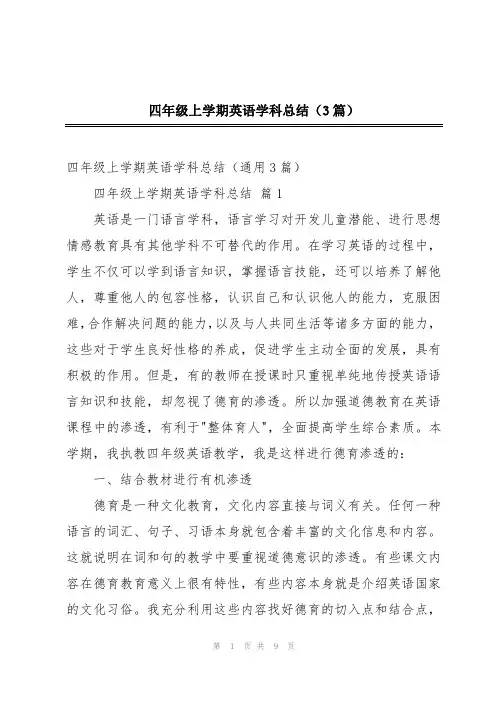
四年级上学期英语学科总结(3篇)四年级上学期英语学科总结(通用3篇)四年级上学期英语学科总结篇1英语是一门语言学科,语言学习对开发儿童潜能、进行思想情感教育具有其他学科不可替代的作用。
在学习英语的过程中,学生不仅可以学到语言知识,掌握语言技能,还可以培养了解他人,尊重他人的包容性格,认识自己和认识他人的能力,克服困难,合作解决问题的能力,以及与人共同生活等诸多方面的能力,这些对于学生良好性格的养成,促进学生主动全面的发展,具有积极的作用。
但是,有的教师在授课时只重视单纯地传授英语语言知识和技能,却忽视了德育的渗透。
所以加强道德教育在英语课程中的渗透,有利于"整体育人",全面提高学生综合素质。
本学期,我执教四年级英语教学,我是这样进行德育渗透的:一、结合教材进行有机渗透德育是一种文化教育,文化内容直接与词义有关。
任何一种语言的词汇、句子、习语本身就包含着丰富的文化信息和内容。
这就说明在词和句的教学中要重视道德意识的渗透。
有些课文内容在德育教育意义上很有特性,有些内容本身就是介绍英语国家的文化习俗。
我充分利用这些内容找好德育的切入点和结合点,进行自然的渗透,使学生在接受英语知识的同时,潜移默化地接受思想品德教育。
例如,“Good morning!”“How are you?”“Hello!”“Nice to meet you!”“Thank you!”“Sorry。
”等礼貌用语,是学生学习英语最初接触的内容。
教师要善于利用学生初学英语时的兴趣,创设真实的语言情景,在学生进行语言操练的过程中,不失时机地对学生进行文明礼貌教育。
实践证明:通过英语课堂中的德育渗透,学生的行为比以前文明、礼貌了。
又如在学习“Can I help?”时,告诉学生不仅售货员要这么招待顾客,当我们看到别人有困难时,也应主动、热情地向对方提供帮助,培养学生助人为乐的美德。
二、善于抓住教育契机,进行有意渗透在我们的课堂教学中,随时随地都会发生一些看似平常却又蕴涵教机的事件,关键是教师要善于发现和捕捉契机,选择好英语教学和思想教育的结合点,进行有意的教育,使德育在课堂上得到切实的渗透。
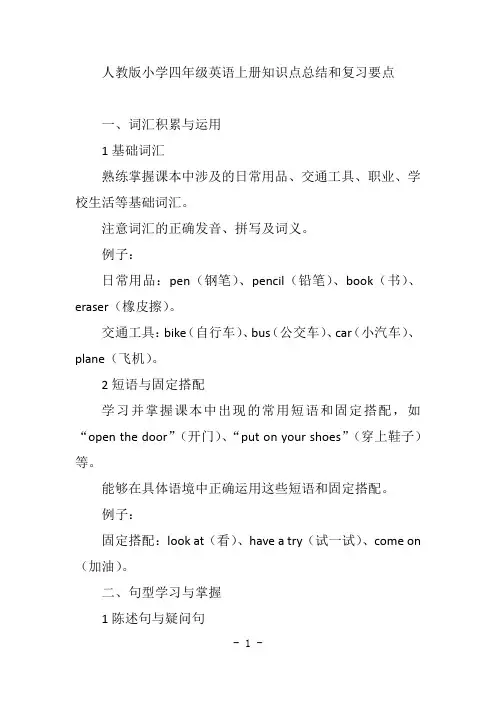
人教版小学四年级英语上册知识点总结和复习要点一、词汇积累与运用1基础词汇熟练掌握课本中涉及的日常用品、交通工具、职业、学校生活等基础词汇。
注意词汇的正确发音、拼写及词义。
例子:日常用品:pen(钢笔)、pencil(铅笔)、book(书)、eraser(橡皮擦)。
交通工具:bike(自行车)、bus(公交车)、car(小汽车)、plane(飞机)。
2短语与固定搭配学习并掌握课本中出现的常用短语和固定搭配,如“open the door”(开门)、“put on your shoes”(穿上鞋子)等。
能够在具体语境中正确运用这些短语和固定搭配。
例子:固定搭配:look at(看)、have a try(试一试)、come on (加油)。
二、句型学习与掌握1陈述句与疑问句熟练掌握陈述句和疑问句的基本结构,能够正确运用主语、谓语和宾语。
学会使用疑问句询问信息,如“What’s this?”(这是什么?)和“Where is your book?”(你的书在哪里?)。
例子:陈述句:I have a new pencil box.(我有一个新的铅笔盒。
)疑问句:Do you like playing football?(你喜欢踢足球吗?)2特殊疑问句学习并掌握“What color is it?”(它是什么颜色的?)、“How old are you?”(你多大了?)等特殊疑问句及其回答方式。
能够根据问题提供正确的信息。
例子:特殊疑问句:What do you usually do on weekends?(你周末通常做什么?)回答:I usually go to the park with my family.(我通常和家人去公园。
)三、语音与语调规则1元音与辅音发音复习并巩固元音和辅音的发音规则,注意发音的准确性和清晰度。
练习发音相近或容易混淆的词汇,提高发音敏感度。
发音练习:正确区分“thin”(瘦的)和“thing”(事情)的发音。
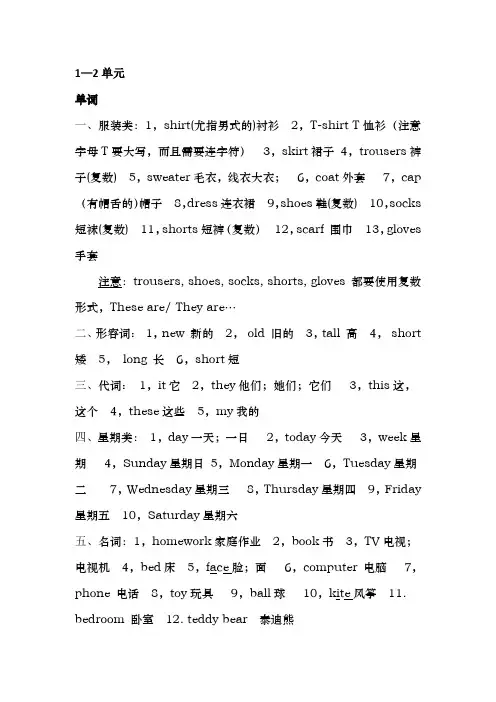
1—2单元单词一、服装类:1,shirt(尤指男式的)衬衫2,T-shirt T恤衫(注意字母T要大写,而且需要连字符)3,skirt裙子4,trousers裤子(复数) 5,sweater毛衣,线衣大衣;6,coat外套7,cap (有帽舌的)帽子8,dress连衣裙9,shoes鞋(复数) 10,socks 短袜(复数) 11,shorts短裤(复数)12,scarf 围巾13,gloves 手套注意:trousers, shoes, socks, shorts, gloves 都要使用复数形式,These are/ They are…二、形容词:1,new 新的2,old 旧的3,tall 高4,short 矮5,long 长6,short短三、代词:1,it它2,they他们;她们;它们3,this这,这个4,these这些5,my我的四、星期类:1,day一天;一日2,today今天3,week星期4,Sunday星期日5,Monday星期一6,Tuesday星期二7,Wednesday星期三8,Thursday星期四9,Friday 星期五10,Saturday星期六五、名词:1,homework家庭作业2,book书3,TV电视;电视机4,bed床5,face脸;面6,computer 电脑7,phone 电话8,toy玩具9,ball球10,kite风筝11. bedroom 卧室12. teddy bear 泰迪熊六、动词类:1,read 读;阅读2,watch看;注视3,listen (注意地)听4,wash 洗;洗涤5,fly飞;放飞6,play 玩;做游戏7,do 做,干,办(某事);无词义(用于第一、二人称主语,构成否定句、疑问句等的助动词)8,clean打扫;干净的9,listen to注意地. (倾听)10,with 和……在一起;同,跟11,play with拿……玩;和……一起玩12,is 是(用于he,she,it及单数可数名词和不可数名词后)13,are 是(用于we,you,they及复数名词后)14. wear 穿着七、其他:Miss 小姐,女士(用于未婚女子姓氏或姓名前,以示礼貌)重点短语(会应用、背写)1. do homework 做作业2. read a book 读书3. write a story 写故事4. draw picture 画画5. help my mum and dad 帮助我的爸爸妈妈6. talk on the phone 讲电话7. watch TV 看电视8. play on the computer 玩电脑9. make bed 铺床,整理床铺10. clean bedroom 打扫卧室11. play with teddy bear 和泰迪熊一起玩儿12. listen to music 听音乐13.brush teeth 刷牙14. wash face 洗脸15. brush hair 梳头16. put on clothes 穿衣服(take off clothes 脱衣服)17.fly kites 放风筝18. play with friends 和朋友一起玩儿19. play catch with a ball 玩接球游戏20.play with toy 玩玩具21. have breakfast 吃早饭22. go home with… 和某人一起回家23. come back 回来24. put… up in the tree把某物放到树上25.wash clothes 洗衣服26. sing a song 唱歌27. play a game 玩游戏28. call… 给某人打电话29. fall off 掉下30. play together 一起玩耍重点句型1. This is a red skirt. 这是一条红色的短裙。
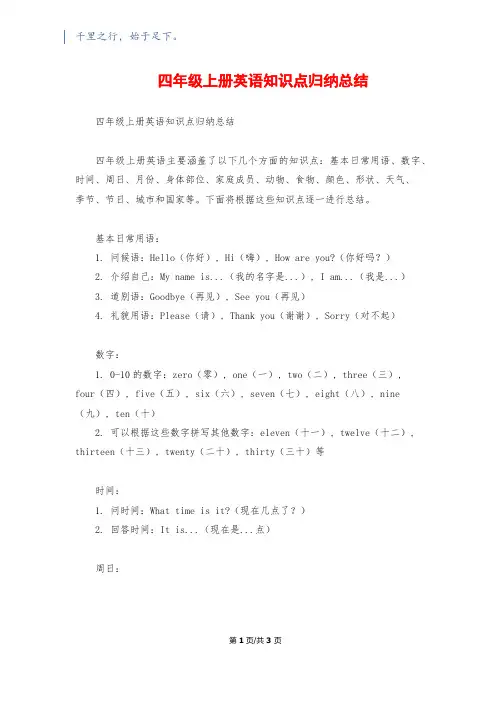
千里之行,始于足下。
四年级上册英语知识点归纳总结四年级上册英语知识点归纳总结四年级上册英语主要涵盖了以下几个方面的知识点:基本日常用语、数字、时间、周日、月份、身体部位、家庭成员、动物、食物、颜色、形状、天气、季节、节日、城市和国家等。
下面将根据这些知识点逐一进行总结。
基本日常用语:1. 问候语:Hello(你好), Hi(嗨), How are you?(你好吗?)2. 介绍自己:My name is...(我的名字是...), I am...(我是...)3. 道别语:Goodbye(再见), See you(再见)4. 礼貌用语:Please(请), Thank you(谢谢), Sorry(对不起)数字:1. 0-10的数字:zero(零), one(一), two(二), three(三),four(四), five(五), six(六), seven(七), eight(八), nine (九), ten(十)2. 可以根据这些数字拼写其他数字:eleven(十一), twelve(十二), thirteen(十三), twenty(二十), thirty(三十)等时间:1. 问时间:What time is it?(现在几点了?)2. 回答时间:It is...(现在是...点)周日:第1页/共3页锲而不舍,金石可镂。
1. Monday(星期一), Tuesday(星期二), Wednesday(星期三), Thursday(星期四), Friday(星期五), Saturday(星期六), Sunday(星期日)月份:1. January(一月), February(二月), March(三月), April(四月), May(五月), June(六月), July(七月), August(八月), September(九月), October(十月), November(十一月), December(十二月)身体部位:1. head(头), eyes(眼睛), ears(耳朵), nose(鼻子), mouth(嘴巴), teeth(牙齿), hand(手), arm(手臂), leg(腿), foot(脚)家庭成员:1. father(爸爸), mother(妈妈), sister(姐姐), brother(弟弟), grandmother(奶奶), grandfather(爷爷)动物:1. cat(猫), dog(狗), bird(鸟), fish(鱼), rabbit(兔子), monkey(猴子), tiger(老虎), elephant(大象), lion(狮子), panda (熊猫)食物:1. apple(苹果), banana(香蕉), orange(橙子), watermelon(西瓜), strawberry(草莓), bread(面包), cake(蛋糕), rice(米饭), noodles(面条)颜色:千里之行,始于足下。
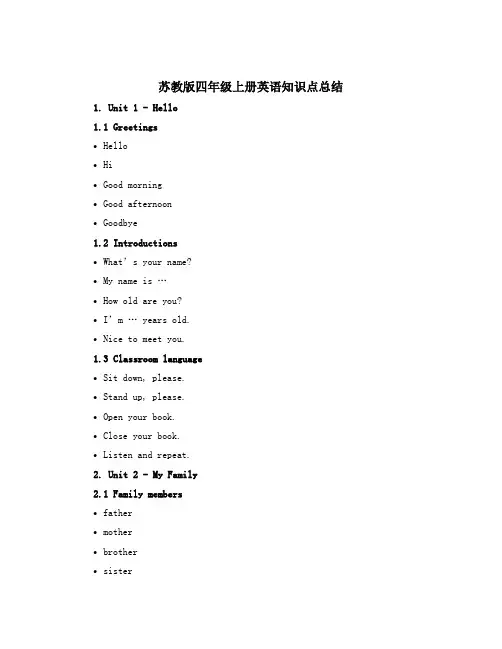
苏教版四年级上册英语知识点总结1. Unit 1 - Hello1.1 Greetings•Hello•Hi•Good morning•Good afternoon•Goodbye1.2 Introductions•What’s your name?•My name is …•How old are you?•I’m … years old.•Nice to meet you.1.3 Classroom language•Sit down, please.•Stand up, please.•Open your book.•Close your book.•Listen and repeat.2. Unit 2 - My Family2.1 Family members•father•mother•brother•sister•grandfather •grandmother2.2 Family relations •This is my …•He/She is my …•These are my …•They are my …2.3 Possessive pronouns •My•Your•His•Her•Our•Their3. Unit 3 - My School 3.1 School objects •desk•chair•blackboard•chalk•book•pen•pencil•eraser•ruler3.2 School subjects •English•Chinese•math•music•art•P.E.3.3 Classroom language•What’s this in English/Chinese?•Can you spell it?•How do you say it?•Let’s sing/dance/play.•I like/love/hate …4. Unit 4 - My Home4.1 Rooms•living room•bedroom•kitchen•bathroom4.2 Home objects•sofa•bed•table•chair•television•refrigerator•toilet•shower4.3 Prepositions of place•on•in•under•next to•behind•in front of5. Unit 5 - My Day5.1 Daily routine•get up•brush teeth•wash face•have breakfast•go to school•have lunch•go home•do homework•have dinner•go to bed5.2 Time expressions•at six o’clock•in the morning/afternoon/evening •before/after school•on weekdays/weekends•today/tomorrow/yesterday5.3 Adverbs of frequency •always•usually•often•sometimes•hardly ever•never6. Unit 6 - My Food6.1 Food and drinks•rice•noodles•bread•hamburger•hot dog•egg•milk•juice•tea•water6.2 Adjectives of taste•sweet•sour•salty•bitter6.3 Expressions of likes and dislikes •I like …•I don’t like …•Do you like …?•Yes, I do.•No, I don’t.。

外研版四年级英语上册知识总结姓名:Module 11.go straight on 直着走2.turn left 向左转turn right 向右转3.excuse me 对不起,打扰一下4.next to 贴近,紧靠...旁边so much 十分,非常5.at the station 在车站up the hill 上山down the hill 下山6.询问某个地方位置的句型:Where + be动词+ 主语?例句:——Excuse me, Where’s the school, please?打扰一下,请问学校在哪里?——Go straight on......7.表示感谢的句型:问句:——Thank you so much! 非常感谢!答语:——You’re welcome. 不客气。
Module 21.take pictures 照相listen to music 听音乐talk to 和......交谈watch TV 看电视read a book 看书write a letter 写信fly a kite 放风筝ride a bike 骑自行车play basketball 打篮球play football 踢足球play with 玩...... look at 看2.介绍某人的句型:This is...... 这是......例句:This is my mother. 这是我的妈妈。
3.现在进行时:表示说话时正在进行或发生的动作。
“正在做......”肯定结构:主语+be(am/ is/ are) + 现在分词+ 其他。
例句:I’m taking picture. 我在照相。
She’s reading a book. 她正在看书。
4.现在进行时的特殊疑问句句型:What + be + 主语+ doing?例句: What are you doing? 你正在做什么?What is he/ she / it doing ? 他/ 她/ 它正在做什么?What are they doing ? 他们正在做什么?Module 3 1.get on the bus 上公共汽车lots of 许多in the park 公园里on the lake 湖面上dragon boat 龙舟play chess 下象棋draw picture 画画soya milk 豆浆2.现在进行时的句型结构:①肯定形式:主语+ be( am/ is/ are)+ doing+ 其他成分。
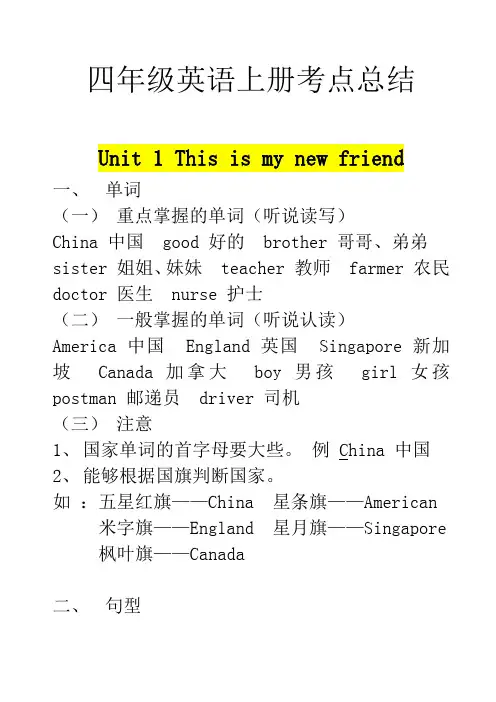
四年级英语上册考点总结Unit 1 This is my new friend一、单词(一)重点掌握的单词(听说读写)China 中国 good 好的 brother 哥哥、弟弟sister 姐姐、妹妹 teacher 教师 farmer 农民doctor 医生 nurse 护士(二)一般掌握的单词(听说认读)America 中国 England 英国 Singapore 新加坡Canada 加拿大boy男孩girl女孩postman 邮递员 driver 司机(三)注意1、国家单词的首字母要大些。
例 China 中国2、能够根据国旗判断国家。
如:五星红旗——China 星条旗——American 米字旗——England 星月旗——Singapore枫叶旗——Canada二、句型(一)重点句型1、表述我来自哪里 I’m from +国家我来自…例:I’m from China . 我来自中国。
2、询问别人来自哪里Where are you from ?你来自哪里?I’m from+国家. 我来自……例:Where are you from ?你来自哪里?I’m from America. 我来自美国3、Who’s this boy ? 这个男孩是谁?He’s my brother .他是我的哥哥(弟弟).Who’s this girl ? 这个女孩是谁?She’s my sister. 她是我的姐姐(妹妹).4、询问父母的职业What does your father do? 你爸爸是干什么的?He’s a +职业. 他是一名…What does your mother do? 你妈妈是干什么的?She’s a +职业. 她是一名…例What does your father do? 你爸爸是干什么的?He’s a farmer . 他是一名农民。
注意:he指男他,与表示男性的boy 、 father 等连用;she指女她,与表示女性的girl、mother等连用(二)其他句子1、第一次见面(陌生人)Nice to see you .第二次见面(认识的人)Nice to see you again.2、欢迎来到我家。
四年级上册英语总结归纳一、单词。
1. 重点单词分类。
- 数字类:one(一)、two(二)、three(三)、four(四)、five(五)、six(六)、seven(七)、eight(八)、nine(九)、ten(十)、eleven(十一)、twelve(十二)、thirteen(十三)、fourteen(十四)、fifteen(十五)、sixteen(十六)、seventeen(十七)、eighteen(十八)、nineteen(十九)、twenty(二十)、thirty(三十)、forty(四十)、fifty(五十)等。
- 人物类:student(学生)、teacher(教师)、friend(朋友)、boy(男孩)、girl(女孩)、man(男人)、woman(女人)等。
- 学习用品类:book(书)、pen(钢笔)、pencil(铅笔)、pencil - box(铅笔盒)、ruler(尺子)、eraser(橡皮)等。
- 家庭用品类:bed(床)、desk(书桌)、chair(椅子)、window(窗户)、door(门)等。
- 动物类:cat(猫)、dog(狗)、pig(猪)、duck(鸭)、bird(鸟)等。
2. 单词的记忆方法。
- 联想记忆:例如,pencil(铅笔),可以联想成“pen(钢笔)+cil”,把它想象成是钢笔的“小弟”,是一种比较细长的书写工具。
- 图像记忆:对于动物类单词,如cat(猫),可以在脑海中想象出一只可爱的小猫的样子,它的耳朵、眼睛、尾巴等特征,这样有助于记忆单词。
- 分类记忆:将单词按照不同的类别进行分类,如数字类、人物类等,这样可以系统地记忆单词,而且在记忆过程中可以发现同类单词之间的规律。
二、句型。
1. 介绍人物。
- This is my friend.(这是我的朋友。
)- He/She is a student.(他/她是一名学生。
)- His/Her name is Tom/Mary.(他/她的名字是汤姆/玛丽。
人教版英语四年级上册重点语法总结一、be动词的用法(am is are)1. 第一人称单数I配合am来用,句型为"I am + ..."例句:I am from Asutralia. 我来自澳大利亚。
2.第二人称You配合are来用,句型为"You are + ..."例句:You are so kind. 你真的很和蔼。
3.第三人称单数配合is来用,句型为"She/He/It is +..."例句:She is a student. 她是一个学生。
4.人称复数配合are来用,句型为"We/You/They are+..."例句:We are in Class 5. 我们来自5班。
二、疑问句汇总问东西-what(什么)问谁-who(谁)问原因-why(为什么)问谁的-whose(谁的)问选择-which(哪一个)问地点-where(在哪里)问意见-what about(怎么样)问目的-what for(为何目的)问情况-how(怎么样)问颜色-what color(什么颜色)问年龄-how old(多大)问时间-when(什么时候)问数量-how many(多少)问时间-what time(什么时间)问价钱-how much(多少钱)问具体日期-what date(什么日期)问路程-how far(多远)问星期-what day(星期几)三、五大基本句型1. 第一种句型:主谓SV主语+谓语动词I know.(我知道)2.第二种句型:主谓宾SVO主语+谓语+宾语She helped me. (她帮助了我)3.第三种句型:主谓宾宾SVOO主语+谓语+间接宾语 +直接宾语He gave me a book. (他给了我一本书)4.第四种句型:主谓宾宾补SVOC主语+谓语 + 宾语 +宾语补足语The story made you happy(这个故事让你开心)5.第五种句型:主系表SVC主语+系动词+表语She is kind(他很和蔼)四、小学英语常见的缩写形式1. 代词与系动词的缩写I'm=I am he's=he is it's = it is that's= that isyou're = you are we're=we are they're = they are 2.系动词、助动词与副词的缩写isn't = is not can't = can not haven't = have not don't = do not doesn't = does not won't = will not 3.疑问词与系动词的缩写who's = who is how's = how is when's = when is what's = what is where's = where is4.代词与助动词的缩写I'd = I would we'll = we will we've = we have五、人称代词,主代词,反身代词汇总注意:第三人称主格she he it的复数形式都是 they第三人称宾格 her him it的复数形式都是 them六、反身代词的用法:可作同位语,宾语,表语例句1: The little boy goes to school himself.(这个小男孩自己去上学。
陕旅版四年级英语上学期全册知识点梳理Unit1 what is your father?一、单元单词(10个)nurse 护士cook 厨师farmer 农民doctor医生worker 工人driver 司机policeman 警察want 想;要be 是man 男人二、重点句子Li Shan, what is your father?李珊,你爸爸是做什么的?He is a cook.他是一名厨师。
What about your mother?你妈妈呢?She is a doctor.她是一名医生。
Su Nan, what is your father?苏南,你爸爸是做什么的?My father is a worker.我爸爸是一名工人。
Is your mother a worker, too?你妈妈也是一名工人吗?No, she isn’t. She is a nurse.不,她不是。
她是一名护士。
Is she your sister?她是你姐姐吗?Yes.是的。
What is she?她是做什么的?She is a bus driver.她是一名公共汽车司机。
Wow! I want to be a bus driver, too!哇!我也想成为一名公共汽车司机!Who is that man?那个男人是谁?He is my brother.他是我哥哥。
What is he?他是做什么的?He is a policeman.他是一名警察。
Wow! I want to be a policeman, too! What about you? 哇!我也想要成为一名警察!你呢?I want to be a doctor.我想成为一名医生。
What’s your father?你爸爸是做什么的?What’s your father?你爸爸是做什么的?He is a doctor.他是一名医生。
He is a doctor.他是一名医生。
史上最全四年级英语知识点一、名词(Nouns)名词是用来表示人、事物、动物、地点等具体或抽象的东西。
名词通常可以单数形式和复数形式。
1.单数名词单数名词表示一个人、一个事物或一个概念。
例如:book(书)、cat(猫)、table(桌子)等。
2.复数名词复数名词表示多个人、多个事物或多个概念。
通常在名词后加-s或-es。
例如:books(书籍)、cats(猫咪)、tables(桌子)等。
二、动词(Verbs)动词是表示行为或状态的词语。
1.一般现在时一般现在时表示经常性或普遍性的动作或状态。
例如:Iplay basketball.(我打篮球。
)2.一般过去时一般过去时表示过去发生的动作或状态。
通常在动词后加-ed。
例如:She watched a movie yesterday.(她昨天看了一部电影。
)3.一般将来时一般将来时表示将来要发生的动作或状态。
通常在动词前加will。
例如:They will go to the park tomorrow.(他们明天将去公园。
)三、形容词(Adjectives)形容词用来描述名词的特征或性质。
1.形容词的比较级形容词的比较级用来比较两个人或事物的不同程度。
通常在形容词后加-er。
例如:She is taller than her sister.(她比她的姐姐高。
)2.形容词的最高级形容词的最高级用来表示三个或更多人或事物之间的比较。
通常在形容词前加the。
例如:He is the tallest boy in the class.(他是班上最高的男孩。
)四、副词(Adverbs)副词用来修饰动词、形容词或其他副词。
1.副词的用法副词可以修饰动词,表示动作的方式或程度。
例如:Heruns fast.(他跑得快。
)2.副词的位置副词通常放在动词之后。
例如:She sings beautifully.(她唱得很美。
)五、代词(Pronouns)代词用来替代名词,以避免重复。
小学英语沪教版(三年级起点)四年级上册知识点总结Unit l Meeting new people知识梳理一、Words:1.meet结识 2.new新的 3.morning早晨4.classmate同班同学 5. her她的 6.name名字7.sit坐 8.afternoon下午 9.his他的10. boy男孩 11. here这里 12. sister姐姐,妹妹13. girl女孩 14. brother兄弟 15. nice好的二、Phrases:1. good morning早上好 2.good afternoon下午好3.sit here坐在这儿 4.your new classmate你的新同学5.my name我的名字 6.my classmate我的同学7.her name她的名字 8.his name他的名字三、Sentences:1.Nice to meet you.见到你很高兴。
2.My name is Jill.或My name's Jill.我的名字叫Jill。
3.This is your new classmate.这是你的新同学。
4.Her name's Kitty.她的名字叫Kitty。
5.You can sit here.你可以坐在这儿。
6.This is my brother.这是我的兄弟。
7.What about you? 你呢?/你怎么样呢?重点点拨1.hello和hi的用法区别:hello和hi都用在日常见面时打招呼,中文意思表示“你好”、“嗨”或“喂”;hello比hi更正式,hi比hello显得更随便:在同学或较熟悉的人之间常用hi,在打电话时只能用hello问候对方。
2.Nice to meet you.在第一次见面相互认识时经常会用这句话来问候对方,回答时经常会说Nice to meet you,too. 213.注意形容词性物主代词(简称“形物”)的使用:my(我的),your(你的),his(他的),her(她的),its(它的),our(我们的),your(你们的),their(他们的,她们的,它们的):这些形容词性物主代词后面一定要接名词,即要接人或物。
广州版四年级上册英语知识梳理一、词汇梳理1. 动物:cat(猫)、dog(狗)、elephant(大象)、lion(狮子)等。
2. 食物:apple(苹果)、banana(香蕉)、bread(面包)、rice(米饭)等。
3. 人物:teacher(老师)、student(学生)、doctor(医生)、police officer(警察)等。
二、基础语法梳理1. 一般现在时:表示经常性或普遍性的动作或状态。
- 主语 + 动词原形:I like ice cream.(我喜欢冰淇淋。
)2. 疑问句:用于询问特定信息。
- 疑问词 + 助动词/情态动词 + 主语 + 动词原形:What can you do?(你会做什么?)3. 陈述句变否定句:句子的意思相反。
- 主语 + do/does not + 动词原形:He does not like soccer.(他不喜欢足球。
)三、常用表达梳理1. 问候:Hello!(你好!)、Good morning!(早上好!)、Good afternoon!(下午好!)、Good evening!(晚上好!)等。
2. 介绍自己:My name is [name].(我叫[name]。
)、I am [age] years old.(我[age]岁。
)、I live in [place].(我住在[地点]。
)等。
3. 表达喜好:I like [activity/food].(我喜欢[活动/食物]。
)、I love [animal/subject].(我爱[动物/科目]。
)等。
四、句型梳理1. What's your hobby?(你的爱好是什么?)My hobby is [hobby].(我的爱好是[hobby]。
)2. Does he like basketball?(他喜欢篮球吗?)Yes, he does. / No, he doesn't.(是的,他喜欢。
4A Module4 Unit1 A visit to a farm过关纸Class:______________ Name:______________一、词汇hay干草(不可数) grass草(不可数) meat肉(不可数) corn玉米, 谷物(不可数) farm农场 visit拜访,参观 bin箱子 rubbish垃圾(不可数) rubbish bin垃圾箱 here 这儿 there 那儿 everywhere 到处throw 扔 stone 石头 litter 乱扔(垃圾) pick 摘scarf 围巾 skateboard 滑板 fast and far 又快又远Quack-quack! (ducks) 鸭子叫声 Oink-oink! (pigs) 猪叫声Nay-nay! (horses) 马叫声 Bar-bar! (sheep) 羊叫声Moo-moo! (cows) 牛叫声 live in a pen 居住在围栏里throw stones 扔石头 on the farm 在农场上visit the farm 参观农场 feed the animals 喂养动物outside the pen 在围栏的外面 swing his two big ears 扇动大耳朵Old MacDonald’s farm 老麦克唐纳的农场 feed the pig with corn 用谷物喂猪wear a red scarf 戴着一条围巾 skate on the skateboard 滑滑板put the rubbish in the rubbish bin 把垃圾放入垃圾箱二、句型1. Don’t …后面跟动词原形,表示叫对方不要做某事。
Don’t litter. 不要扔垃圾Don’t walk on the gr ass. 不要在草地上散步。
Don’t pick flowers. 不要摘花。
Don’t throw stones. 不要扔石头。
(注:以上句型可用You can’t … 的句型作转换, 如“You can’t throw stones.”)2. Let’s…后面跟动词原形,表示邀请对方和自己一起做某事。
Let’s visit the farm. 让我们参观农场.Let’s go to the farm. 让我们去农场.Let’s have lunch in the restaurant. 让我们在餐馆吃午饭。
三、语法:1. Here be就近原则:如果出现两种及以上物体时,就看最靠近here be的名词,如果是单数可数名词或不可数名词就用here is…;如果是复数名词就用here are...如: Here is a bone for the dog. 有一根骨头给这只狗。
Here are two bones for the dog. 有两根骨头给这只狗。
Here is some meat for the dog. 有一些肉给这只狗。
Here is some meat and two bones for the dog. 有一些肉和两根骨头给这只狗。
2. 用名词复数表示整个一类东西。
如:What do horses eat? 马吃什么? They eat hay. 他们吃干草。
3. 祈使句否定形式在动词前加don’t, 要注意please的位置。
1) 肯定句: Feed the animals, please.否定句:Don’t feed the animals, please.2) 肯定句: Please feed the animals.否定句: Please don’t feed the animals.四.语音sc- /sk/ sc arf sc arlet sk- /sk/ sk ate sk ateboard sk irt4A Module4 Unit2 At century park过关纸Class:______________ Name:______________一.词汇sketchbook 写生本 cap帽子 camera照相机 fountain喷水池an aviary一个鸟舍 some aviaries 一些鸟舍 pond池塘far away离……远 road马路 take the school bus 乘坐校车picnic basket 野餐篮子 peanut 花生 butter黄油 peanut butter花生酱plant 植物 a plant house一个植物房(阳光房) ready 准备some bread 一些面包 some candy一些糖果(不可数名词) have a picnic 野餐go to Century Park 去世纪公园 at Century Park 在世纪公园take some photos 拍一些照片 the map of the park 这张公园的地图watch the fish and ducks 观赏鱼和鸭子 play on the swing 在秋千上玩show the photos 展示照片 have a look 看一看二、句型1. -----Where is Century Park ? 世纪公园在哪里?----- It’s far away from our school. 它离我们的学校很远2. It’s near our school. 它在我们的学校附近。
3. ---- What do you have? 你有什么?---- I have a camera. 我有一个相机4. ---- Can we take photos ? 我们能拍照吗?---- Of course. 当然。
5. ---- Are you ready? 准备好了吗?---- Yes,I am. /Yes, we are. 是的。
三、语法1. 特殊疑问词“Where”表示“在哪里”,常用于询问人或物体的位置。
如: Where is Danny?He’s beside the fountain.Where is the plant house? It’s next to the aviaries.Where are the birds? They’re in the aviary.(注意be动词的正确运用)2. “What do/does … have?”常用于询问对方或他人拥有什么事物。
如: What do you hav e, Danny? I have a cap and a pair of sunglasses.What does Danny have? He has a cap and a pair of sunglasses.(注意助动词的变化,以及问答句中have/has的变化和搭配)三.语音th- [ð] th is th at th ese th ose th ey th ere th eir四、小作文:A visit to the _______要求:用至少30个词,三种及以上句型,六句以上的句子介绍一次户外活动。
A visit to the farmIt’s sunny. My friends and I are on th e farm. There are many animals on it. They’re horses, cows, pigs, ducks and hens. Look, horses like hay. Cows like grass. Pigs, ducks and hens all like corn. We can feed animals there. But we can’t litter. I like the farm. It is big and beautiful.A visit to the parkIt’s a fine day. I go to Century Park with my family. Century Park is a big park in Shanghai. There is a fountain, a plant house, a pond and some aviaries in it. In the plant house, I can see many beautiful flowers and plants. Look, the aviaries are homes for the birds. There are a lot of nice birds in it. I can take photos there. What a happy day!4A Module4 Unit3 Weather过关纸Class:______________ Name:______________一.词汇sunny阳光明媚的 rainy下雨的 cloudy多云的 windy刮风的warm温暖的 hot热的 wet潮湿的 dry干燥的January一月 February二月 March三 April四月May五月 June六月 July七月 August八月September九月 October十月 November十一月 December十二月China中国 Australia 澳大利亚 weather 天气 always总是,一直often 经常 then 那时 make phone calls 打电话each other 相互 season 季节 year 年 leaf 叶子(复:leaves) fall 落下 play on the swing 在秋千上玩 in Australia 在澳大利亚at Christmas 在圣诞节 have a Christmas party 举办圣诞派对an e-mail from Amy 一封来自Amy的电子邮件二、句型1. ------- Where are you from? 你从哪儿来?-------- I am from Australia. 我从澳大利亚来。
2. I live in China. 我住在中国。
My friend Amy lives in Australia. 我的朋友艾米住在澳大利亚。
3. There are four seasons in a year. 一年有四个季节。
They’re spring, summer, autumn and winter. 它们是春夏秋冬。
4. How are you doing? 你好吗?5. Merry Christmas! 圣诞快乐!三.语法:1.特殊疑问句“How is the weather?”常用于询问天气的情况1)询问某个月份的天气情况,如 :-----How’s the weather in Januar y? 一月的天气怎样?------It’s cold. 天气寒冷。